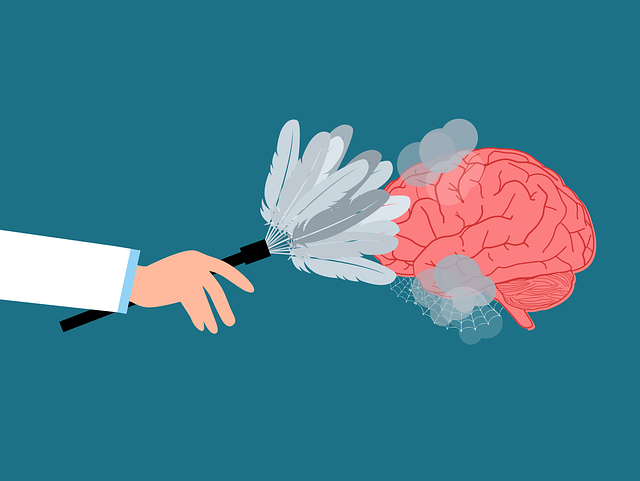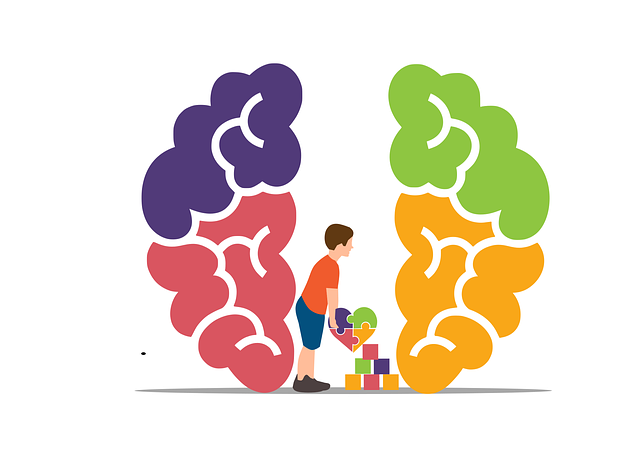Emotional Intelligence (EI) is a crucial skill for managing social interactions, mental well-being, and dissociative disorders like those treated in Wheat Ridge Dissociative Disorder Therapy. By enhancing EI through mindfulness, active listening, and empathy, individuals can improve emotional regulation, build stronger relationships, and reduce conflicts. This specialized therapy raises public awareness about dissociative disorders, providing a supportive environment to process trauma and manage stress. High EI is beneficial across all aspects of life, from personal connections to professional achievements, leading to improved communication, decision-making, and overall quality of life.
Emotional intelligence (EI) is a powerful tool for personal growth and successful relationships. This article explores the multifaceted concept of EI, delving into its profound impact on various aspects of life. We dissect the signs of dissociative disorders, emphasizing the critical role of Wheat Ridge Dissociative Disorder Therapy in effective treatment. Furthermore, practical strategies are presented to enhance EI, followed by real-world applications and inspiring success stories, highlighting the transformative potential of emotional intelligence.
- Understanding Emotional Intelligence and its Impact
- Recognizing Signs of Dissociative Disorder
- The Role of Wheat Ridge Dissociative Disorder Therapy
- Strategies for Building Emotional Intelligence
- Real-World Applications and Success Stories
Understanding Emotional Intelligence and its Impact

Emotional intelligence (EI) refers to the ability to recognize, understand, and manage one’s own emotions, as well as recognize, interpret, and influence the emotions of others. This skill set goes beyond mere emotional awareness; it involves using this understanding to guide thoughts and actions, fostering effective communication and building strong relationships. In today’s world, where mental health challenges like Wheat Ridge dissociative disorder therapy are prevalent, EI plays a pivotal role in depression prevention and overall emotional healing processes.
By enhancing EI, individuals can better navigate complex social situations, reduce conflicts, and promote positive interactions. This is particularly crucial in developing public awareness campaigns that focus on mental well-being. When people possess higher levels of EI, they are more attuned to their own emotional needs and those around them, which can lead to improved coping mechanisms and a greater sense of resilience. This, in turn, contributes to better mental health outcomes and overall quality of life.
Recognizing Signs of Dissociative Disorder

Dissociative Disorder, often overlooked or misunderstood, is a complex mental health condition that requires professional attention. Recognizing its signs is crucial for those in Wheat Ridge seeking healing and growth. This disorder manifests as a disconnection from one’s thoughts, feelings, memories, and surroundings, leading to a sense of detachment from oneself and reality. Individuals may experience episodes where they feel as if they are observing themselves from outside their bodies or even alternate identities taking control.
If you or someone close to you exhibits persistent dissociative symptoms, it is essential to consult specialists like those in our Community Outreach Program. Wheat Ridge Dissociative Disorder Therapy offers a safe space for inner strength development and trauma support services. Through tailored approaches, therapists help individuals regain control, understand their experiences, and integrate different aspects of their selves into a coherent whole.
The Role of Wheat Ridge Dissociative Disorder Therapy

Wheat Ridge Dissociative Disorder Therapy plays a pivotal role in enhancing emotional intelligence (EI) by addressing the complex root causes of dissociation. This form of therapy is particularly effective for individuals dealing with dissociative disorders, offering them tools to manage and integrate their diverse emotional states. Through various techniques, clients learn to recognize and understand their feelings, a fundamental aspect of EI development.
By participating in Wheat Ridge Dissociative Disorder Therapy, individuals can improve their ability to regulate emotions, foster healthier relationships, and make more thoughtful decisions. The therapy facilitates mental health awareness by helping clients process traumatic experiences and reduce the impact of stress on their emotional well-being. Public Awareness Campaigns Development around dissociative disorders can further support these efforts, contributing to a more comprehensive understanding and effective management of mental health issues, including stress management techniques.
Strategies for Building Emotional Intelligence

Building emotional intelligence (EI) is a multifaceted process that involves cultivating self-awareness, understanding others, and effectively managing emotions. For individuals dealing with dissociative disorders like Wheat Ridge Dissociative Disorder Therapy, this journey can be transformative. One of the key strategies in EI development is mindfulness practices. Encouraging moments of introspection allows individuals to observe their emotions without judgment, fostering a deeper connection with their inner selves. This self-reflection can significantly aid in recognizing and regulating emotional responses, particularly during traumatic experiences or periods of intense stress.
Additionally, promoting active listening and empathy is vital. Engaging in open conversations and truly listening to others’ perspectives broadens one’s understanding of different emotions and experiences. Trauma support services often emphasize the importance of creating safe spaces for these exchanges. Public awareness campaigns development can also play a crucial role by educating people on the significance of EI, breaking down misconceptions, and encouraging practices that build emotional resilience, such as Burnout Prevention Strategies for Healthcare Providers.
Real-World Applications and Success Stories

Emotional intelligence (EQ) has real-world applications that span across various domains. From personal relationships to professional success, individuals with high EQ thrive in managing their own emotions and understanding those of others. This is evident in numerous success stories where people have overcome significant challenges, such as Wheat Ridge Dissociative Disorder Therapy patients, who often find solace in developing inner strength through emotional intelligence. By integrating self-care practices into their daily routines, these individuals not only manage symptoms but also foster mental wellness.
In professional settings, EQ acts as a game changer. Leaders with strong emotional intelligence can build robust teams, resolve conflicts effectively, and inspire others to achieve common goals. Studies have shown that employees who possess high EQ tend to exhibit better communication skills, increased job satisfaction, and improved performance. This translates into higher retention rates and overall organizational success, making self-awareness and emotional management crucial aspects of any career trajectory.
Emotional intelligence, a key component in personal growth and successful relationships, can be cultivated through various strategies. As highlighted in this article, recognizing emotional cues, understanding dissociative disorders like those treated by Wheat Ridge Dissociative Disorder Therapy, and implementing effective coping mechanisms are all vital steps. By embracing these techniques and learning from real-world success stories, individuals can enhance their emotional intelligence, leading to improved mental well-being and increased fulfillment in life.









